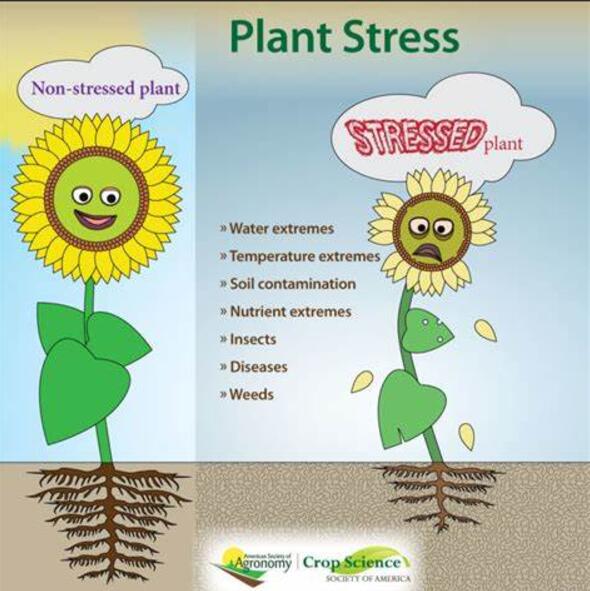Metabolic reconfiguration and proline-mediated responses enhance citrus tolerance to combined water, light and heat stress
IF 6.8
Q1 PLANT SCIENCES
引用次数: 0
Abstract
The co-occurrence of multiple abiotic stress factors has become increasingly common in agricultural systems, largely driven by the intensification of climate change. These overlapping stressors not only occur more frequently but also with greater intensity, posing complex challenges to crop resilience and overall productivity. In this context, the ability of plants to adjust their metabolism plays a pivotal role in facilitating acclimation to such multifaceted environmental pressures. The present study explores how two citrus rootstocks with differing stress tolerance profiles—Carrizo citrange and Cleopatra mandarin—reconfigure their primary metabolism when simultaneously exposed to water limitation, high light exposure, and elevated temperatures. Our results demonstrate that Carrizo exhibits distinct metabolic alterations under high temperature stress, whereas Cleopatra remains largely unaffected, suggesting an inherently lower heat tolerance in Cleopatra. Furthermore, Carrizo plants accumulate proline in response to the triple stress combination, while Cleopatra instead accumulates γ-aminobutyric acid (GABA). Remarkably, treatment with exogenous proline enhances stress tolerance in both genotypes by increasing antioxidant enzyme activities and activating autophagy-related stress response pathways. While previous studies have explored plant responses to individual stress factors, our research reveals that metabolic reconfiguration and proline accumulation are key to coping with the combined effects of water deficit, high irradiance, and extreme temperatures in citrus. These findings underscore the pivotal role of proline metabolism in mitigating the detrimental effects of complex abiotic stresses and point to potential strategies for improving citrus adaptation through metabolic modulation. Overall, our study provides valuable insights into the mechanisms driving plant responses to environmental challenges, which are essential for developing sustainable agricultural practices in the face of climate change.
代谢重组和脯氨酸介导的反应增强了柑橘对水、光、热复合胁迫的耐受性
在气候变化加剧的驱动下,多种非生物胁迫因子的共存在农业系统中变得越来越普遍。这些重叠的压力源不仅发生频率更高,而且强度更大,对作物的抗灾能力和整体生产力构成了复杂的挑战。在这种情况下,植物调节代谢的能力在促进适应这种多方面的环境压力方面起着关键作用。本研究探讨了两种具有不同抗逆性的柑橘砧木——carrizo citrange和Cleopatra mandar橘子——在同时暴露于水分限制、强光暴露和高温条件下如何重新配置它们的初级代谢。我们的研究结果表明,Carrizo在高温胁迫下表现出明显的代谢变化,而埃及艳后在很大程度上没有受到影响,这表明埃及艳后天生耐热性较低。此外,Carrizo植株在三重胁迫下积累脯氨酸,而Cleopatra植株则积累γ-氨基丁酸(GABA)。值得注意的是,外源脯氨酸处理通过增加抗氧化酶活性和激活自噬相关的应激反应途径,增强了两种基因型的应激耐受性。虽然之前的研究已经探索了植物对个体胁迫因素的反应,但我们的研究表明,代谢重构和脯氨酸积累是柑橘应对水分亏缺、高光照和极端温度综合效应的关键。这些发现强调了脯氨酸代谢在减轻复杂非生物胁迫的不利影响中的关键作用,并指出了通过代谢调节提高柑橘适应性的潜在策略。总的来说,我们的研究为植物对环境挑战的响应机制提供了有价值的见解,这对于在面对气候变化的情况下发展可持续的农业实践至关重要。
本文章由计算机程序翻译,如有差异,请以英文原文为准。
求助全文
约1分钟内获得全文
求助全文
来源期刊

Plant Stress
PLANT SCIENCES-
CiteScore
5.20
自引率
8.00%
发文量
76
审稿时长
63 days
期刊介绍:
The journal Plant Stress deals with plant (or other photoautotrophs, such as algae, cyanobacteria and lichens) responses to abiotic and biotic stress factors that can result in limited growth and productivity. Such responses can be analyzed and described at a physiological, biochemical and molecular level. Experimental approaches/technologies aiming to improve growth and productivity with a potential for downstream validation under stress conditions will also be considered. Both fundamental and applied research manuscripts are welcome, provided that clear mechanistic hypotheses are made and descriptive approaches are avoided. In addition, high-quality review articles will also be considered, provided they follow a critical approach and stimulate thought for future research avenues.
Plant Stress welcomes high-quality manuscripts related (but not limited) to interactions between plants and:
Lack of water (drought) and excess (flooding),
Salinity stress,
Elevated temperature and/or low temperature (chilling and freezing),
Hypoxia and/or anoxia,
Mineral nutrient excess and/or deficiency,
Heavy metals and/or metalloids,
Plant priming (chemical, biological, physiological, nanomaterial, biostimulant) approaches for improved stress protection,
Viral, phytoplasma, bacterial and fungal plant-pathogen interactions.
The journal welcomes basic and applied research articles, as well as review articles and short communications. All submitted manuscripts will be subject to a thorough peer-reviewing process.
 求助内容:
求助内容: 应助结果提醒方式:
应助结果提醒方式:


